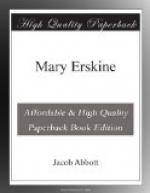When Mary Bell was dressed thus in her working frock, she was allowed to play wherever she pleased, so that she enjoyed almost an absolute and unbounded liberty. And yet there were some restrictions. She must not go across the brook, for fear that she might get lost in the woods, nor go out of sight of the house in any direction. She might build fires upon any of the stumps or logs, but not within certain limits of distance from the house, lest she should set the house on fire. And she must not touch the axe, for fear that she might cut herself, nor climb upon the wood-pile, for fear that it might fall down upon her. With some such restrictions as these, she could do whatever she pleased.
She was very much delighted, one morning in September, when she was playing around the house in her working frock, at finding a great hole or hollow under a stump, which she immediately resolved to have for her oven. She was sitting down upon the ground by the side of it, and she began to call out as loud as she could,
“Mary Erskine! Mary Erskine!”
But Mary Erskine did not answer. Mary Bell could hear the sound of the spinning-wheel in the house, and she wondered why the spinner could not hear her, when she called so loud.
She listened, watching for the pauses in the buzzing sound of the wheel, and endeavored to call out in the pauses,—but with no better success than before. At last she got up and walked along toward the house, swinging in her hand a small wooden shovel, which Albert had made for her to dig wells with in the sand on the margin of the brook.
“Mary Erskine!” said she, when she got to the door of the house, “didn’t you hear me calling for you?”
“Yes,” said Mary Erskine.
“Then why did not you come?” said Mary Bell.
“Because I was disobedient,” said Mary Erskine, “and now I suppose I must be punished.”
“Well,” said Mary Bell. The expression of dissatisfaction and reproof upon Mary Bell’s countenance was changed immediately into one of surprise and pleasure, at the idea of Mary Erskine’s being punished for disobeying her. So she said,
“Well. And what shall your punishment be?”
“What did you want me for?” asked Mary Erskine.
“I wanted you to see my oven.”
“Have you got an oven?” asked Mary Erskine.
“Yes,” said Mary Bell, “It is under a stump. I have got some wood, and now I want some fire.”
“Very well,” said Mary Erskine, “get your fire-pan.”
Mary Bell’s fire-pan, was an old tin dipper with a long handle. It had been worn out as a dipper, and so they used to let Mary Bell have it to carry her fire in. There were several small holes in the bottom of the dipper, so completely was it worn out: but this made it all the better for a fire-pan, since the air which came up through the holes, fanned the coals and kept them alive. This dipper was very valuable, too, for another purpose. Mary Bell was accustomed, sometimes, to go down to the brook and dip up water with it, in order to see the water stream down into the brook again, through these holes, in a sort of a shower.




